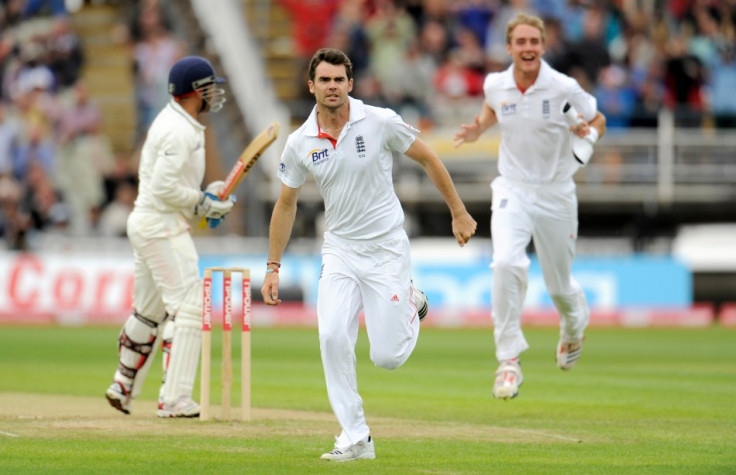England's Pace Attack Points to a Bright 2012 for the World's No.1 Side

England's batsmen have largely dominated the last two years, with Jonathan Trott rightly named the ICC Cricketer of the Year for 2011 and Alastair Cook picking up the Test Cricketer of the year award, but in 2011 the bowlers came back strongly and the trend looks set to continue into 2012.
In Test cricket the quicks -- led once again by South Africa's Dale Steyn, and ably supported by England's Stuart Broad and James Anderson -- have picked up their wickets more cheaply than in previous seasons.
As the numbers show, only once in 2011 has the average for a completed series exceeded 40 - when Sri Lanka toured England for the three-Test series and 42.30 runs were scored per wicket. In almost all the other series, the averages have lingered around 32 to 35, which suggests a reasonably even contest.
There have been other series this year when the bat has dominated the show but 2010's flat tracks have largely been replaced by bowler-friendly pitches capable of producing results inside five days. Captain's requests for grounds-men to prepare livelier pitches have been adhered to and test bowlers have been quick to exploit these conditions, putting pay to the myth that we are in the midst of a "golden age" for batting.
Nowhere was this more apparent than during England's 4-0 demolition of India, a result that culminated in a memorable rise up the ICC rankings table in 2011 for Andy Flower's side. Undoubtedly, 2011 belonged to England and, at the start of a hectic 12-month period; they rightly deserve their position as the No.1 Test side in the world.
In the last 13 months England have comfortably beaten Australia 3-1 in their own back-yard, with all three victories by an innings and runs to spare, overcome Sri Lanka 1-0 and, perhaps most impressively, hammered India 4-0.
For Andrew Strauss a modest year with the bat -- he averaged a miserly 34.46 in all forms of international cricket -- was tempered by an unerring belief and adherence to the strategy laid out with Andy Flower back in September 2010.
Test captaincy is much more than the token gesture its footballing counterpart is afforded and Strauss' fortitude and unflappable resilience have been key factors in creating the England team's on-going culture of success. Winning begets winners, and Strauss' purpose and direction has been the cornerstone of England's remarkable year.
"Strauss is an outstanding leader," said Flower earlier in 2011. "We talk about a hardworking and honest culture where people are constantly striving to improve themselves and the team.
"We talk about a culture of respect for each other and any of the stakeholders in international cricket. Those are some of the qualities Strauss embodies."
But the side's swift rise has been accomplished with a consistency that Michael Vaughan's 2005 Ashes side failed to achieve. Consistency is a buzzword long associated with the game's most successful sides and England must hope they can maintain a stable first-XI if they are to remain the No.1 side in 12 months time.
Shane Warne believes England have the potential to dominate Test cricket over the coming year and, indeed, for the next decade, but cautioned they need to adopt more aggressive tactics in the long-run.

"They have variety in their attack, imagination in their batting and could be as good as any side of the past 20 years, but to dominate they have to improve tactically," said former Australia international Warne.
"England are the best side in the world but that is not good enough in itself... the Australian team stayed No1 by being hungry all the time. In the nets if someone was struggling with the short ball, the fast bowlers would bowl hard at him. Likewise, if a player was struggling against spin.
"There has to be competitiveness in the nets. It is about pushing yourself all the time rather than sitting back and saying "I am all right."
A January series against Pakistan is followed by a brief two-test match-up against Sri Lanka, before the three-Test home series against an emerging West Indies and the ever-consistent South Africa. And in the autumn there is the small matter of a four-Test series in India - 12 months that will define Andy Flower's England reign.
So it is no surprise to find England's selectors touting 'consistency' as the watchword for a busy calendar year. Paul Collingwood's retirement aside, the 16-man squad for the up-coming tour of Pakistan is unchanged from the one that retained the Ashes in Australia last year.
Ravi Bopara's inclusion bolsters England's batting and provides much needed cover for the four-man pace attack. And while England's batsmen garnered the plaudits after their emphatic Ashes victory, it was England's pace attack that fired them to the top of the ICC rankings this summer and Flower will be hoping the same make-up can stay fit throughout a gruelling 2012.
Once again, England have led the field in preparation and match strategy, trawling hundreds of hours of Test footage and pin-pointing the weaknesses of the opposition.
The result, according to journalist Simon Hughes, is an inclination for captains to put teams in and back the bowlers to perform, rather than bat first themselves. Batting second seems to have become the default option as surfaces do not noticeably deteriorate for the fourth innings side.
England sealed their series whitewash of India with a mammoth 710/7 declared batting second after India were scuttled for under 250 in both innings; while the solitary victory against Sri Lanka was achieved in similar circumstances.
But a bold call at the coin-toss is only worthwhile if the bowlers deliver wickets and, in this regard, England's attack have led the way. Among the top wicket-takers of 2011, England's Stuart Broad (22.30) heads the leaderboard for bowlers with the best Test averages, with James Anderson (24.85) running close behind in third.
Pakistan's Saeed Ajmal, the leading wicket-taker of the year so far with 46, will pose a major threat to England in the United Arab Emirates. The Pakistan bowler's battle with Graeme Swann in January should a highlight of the short series, says the World Cricket Show's Adam Bayfield.
"[Ajmal] is the leading wicket-taker in the world this year, he has been arguably the key component in a Pakistan side that stepped away from the brink. The contest with Graeme Swann in January will be fascinating," Bayfield said.
In reality, the increased reliance on Hawkeye and the Decision Review System means it is perhaps no surprise to see the bowlers impress in 2011. The former means umpires are less likely to ignore those off spinners' deliveries that batsmen have previously padded up to. While the DRS allows spinners to overturn more not-out decisions than before.
Going into 2012 England - with a number of younger players including James Taylor, Scott Borthwick and Ben Stokes - have the potential to consolidate their position on top of the world, whether they can convert their rise into long-term dominance remains to be seen.
© Copyright IBTimes 2025. All rights reserved.





















